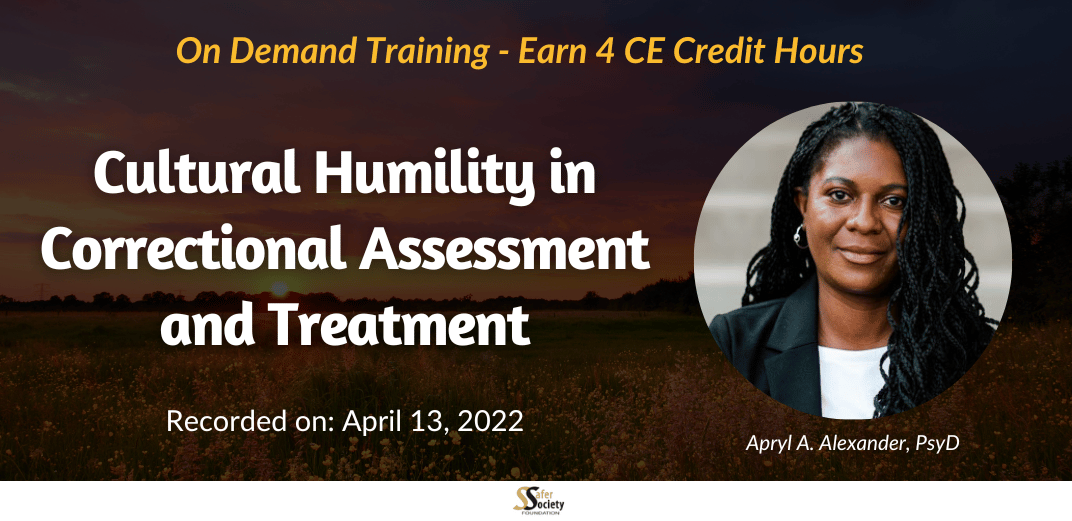
Cultural Humility in Correctional Assessment and Treatment
Already purchased an On Demand training?
Click here to access your Safer Society On-Demand Training Center account.
Sociocultural factors in the assessment and treatment of individuals who sexually offend are important to examine. Awareness of implicit biases and the cultural competence of the therapist are essential in ethical treatment.
Cultural humility is the ability to maintain an interpersonal stance that is other-oriented in relation to aspects of cultural identity that are more important to the client. Professionals become informed of cultural considerations throughout the assessment and treatment processes.
This workshop assists participants in identifying cultural factors (i.e., racial/ethnicity, language, religion, gender/gender identity, sexual orientation, and disability) during assessment to better inform treatment and risk management recommendations.
Topics discussed include:
- Introduction, background information, and overview of terminology
- Implicit biases that prevent acquisition of knowledge on becoming a culturally humble professional.
- Sociocultural factors influencing individuals who commit sexual and other violent crimes.
- Diversity considerations in assessment and treatment processes
- Considerations in the use of risk assessment methodology with diverse populations.
- Considerations in the use of risk assessment methodology with diverse populations.
- How culture affects the context of assessment and treatment and the settings in which they occur
- Identifying common racial micro-aggressions
- Planning for professional development in cultural humility
1) Identify therapist implicit biases and gain knowledge on how to become a culturally humble professional.
2) Identify broad sociocultural (i.e., racial/ethnic, language, religion, gender/gender identity, sexual orientation, and disability) factors that influence individuals who have committed sexual offenses.
3) Describe how cultural differences affect attitudes and beliefs about sexually inappropriate behavior.
4) Describe important diversity considerations for assessment and treatment.
5) Explain the utility of psychological and risk assessment methods with a diverse patient population.
6) Describe and discuss important cultural factors for treatment and management.
7) Identify common micro-aggressions in correctional settings.
8) Identify elements of a professional development plan for cultural humility.
Audience
This training is for professionals working with people who have experienced complex trauma as well as people who have perpetrated abuse. Professionals who will benefit from this training include social workers, psychologists, clinical counselors, and interested paraprofessionals.
Content Level
Disclosure
Continuing Education Approval
American Psychological Association (APA)
Safer Society Foundation, Inc. is approved by the American Psychological Association (APA) to sponsor continuing education for psychologists. Safer Society Foundation, Inc. maintains responsibility for this program and its content.
Association of Social Work Boards (ASWB)
Cultural Humility in Correctional Assessment and Treatment, Course #5113, is approved by the Association of Social Work Boards (ASWB) Approved Continuing Education (ACE) program to be offered by Safer Society Foundation, Inc. as an individual course. Regulatory boards are the final authority on courses accepted for continuing education credit. ACE course approval period: 08/01/2023 - 08/01/2025. Social workers completing this course receive 4 clinical continuing education credits.
Who's Presenting

Apryl A. Alexander, PsyD
Apryl Alexander received a B.S. in Psychology from Virginia Tech and M.S. from Radford University. She also received her M.S. and Psy.D. in Clinical Psychology from the Florida Institute of Technology with concentrations in forensic psychology and child and family therapy. Dr. Alexander completed her pre-doctoral internship at Patton State Hospital, the largest forensic psychiatric hospital in the country. She also completed her post-doctoral fellowship in forensic psychology at Minnesota State Operated Forensic Services (MSOFS) conducting competency to stand trial, competency to proceed, and criminal responsibility evaluations, as well as violence and sexual violence risk assessments. Dr. Alexander co-chaired the Conference Committee for the 2023 ATSA Conference in Aurora, Colorado. Currently, Dr. Alexander is Metrolina Distinguished Scholar in Health and Public Policy and Associate Professor at the Department of Public Health Sciences of The University of North Carolina at Charlotte. Her research interests are focused in the areas of violence, victimization, and forensic assessment.
